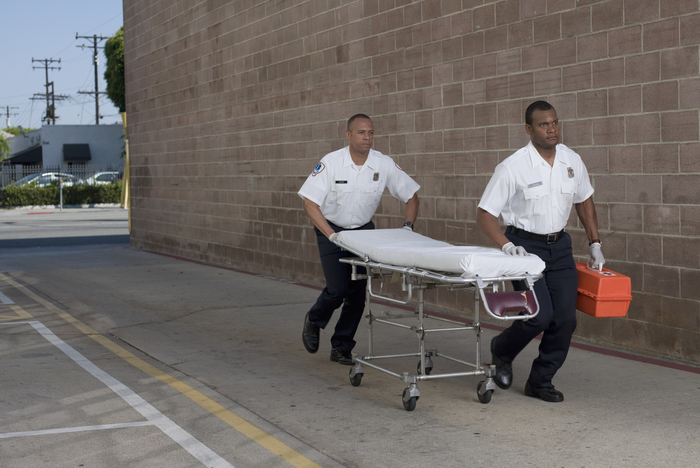
The call came in the moment you placed your gear on the truck—a high-speed crash at that same dangerous intersection. Police on the scene are reporting they have three patients, one of whom is in cardiac arrest. CPR is being administered by bystanders. You hit your siren and respond.
You pull up to a chaotic scene. You and your partner head for the arrest while the backup units tend to the other victims. Your victim has massive facial injuries—the result of an unrestrained driver struck head-on.
The bystanders are doing their best, using a pocket mask, but the patient's airway is flooded with blood. You break out your portable suction unit, crank it on, and realize the catheter and tubing are missing. Whoever used it last forgot to resupply it, and now you're left with a useless unit. You sprint back to your truck as the bystanders stare in frustration.
Proper portable suction machine maintenance is a critical link in your chain of care. Nothing can replace your suction unit, so it had better be ready when needed. So, let's review some fundamental components of proper care and maintenance.
Check Out Your Unit
- Turn it on! The key to machine maintenance is incorporating it into your daily truck checkout. Just as you power up your cardiac monitor, you should also turn on the suction machine to ensure it starts, the batteries are fully charged, and it is functioning properly.
- Inventory is key. Not only should you check your unit's functionality, but you must ensure you have all the necessary parts. These include:
- A selection of catheters to meet any suction challenge
- High-quality suction tubing, with backups on board
- Backup batteries, in case you don't make it back to the station in between calls
- Backup canisters, depending on make and model
Keep It Clean
Another critical step in suction machine maintenance is keeping the unit free of dangerous pathogens. This not only protects your patients but protects you and your coworkers. Suction units can easily become vectors. Here's how:
- Suction inherently deals with bodily fluids, be they blood, sputum, or vomit—key sources of infectious disease.
- There are many nooks and crannies where pathogens can hide in the unit if not properly disinfected after each use.
- Many of our patients carry infectious pathogens, such as bacteria and viruses, which are just waiting for the opportunity to infect a new host.
To prevent your portable suction machine from serving as a vector, here are some guidelines to follow:
- Disinfect after each use! Even if the canister appears clean.
- Use a bleach mix or appropriate disinfectant.
- Replace ALL disposables! Never reuse disposable accessories.
- Clean the external components, such as knobs and handles. Every surface is considered contaminated!
- Follow the manufacturer's recommendations so that warranties remain in effect.
Proper portable suction machine maintenance is critical to the success of your treatment. The need for suction can arise on any call, so be sure your unit is ready and able to fulfill its vital role.
Portable suction saves lives, so it has to be reliable. For assistance buying the right emergency equipment, download our free guide, The Ultimate Guide to Purchasing a Portable Emergency Suction Device.
Editor's Note: This blog was originally published in June, 2017. It has been re-published with additional up to date content.
















